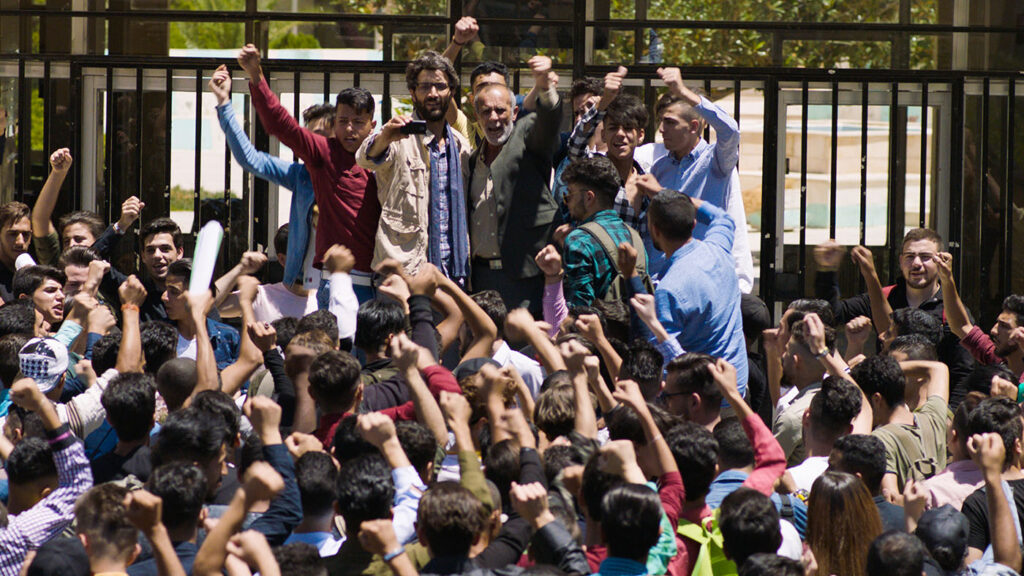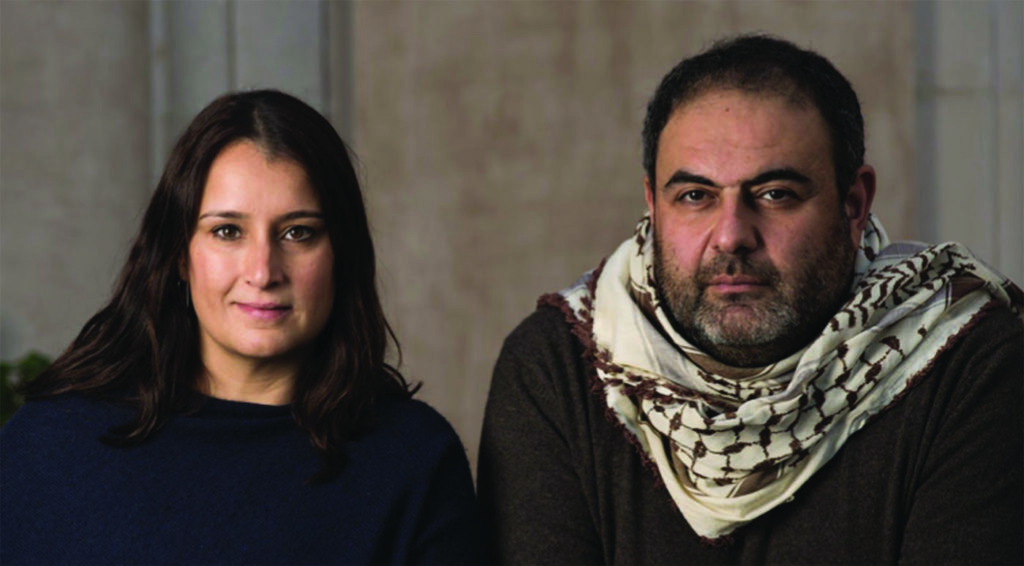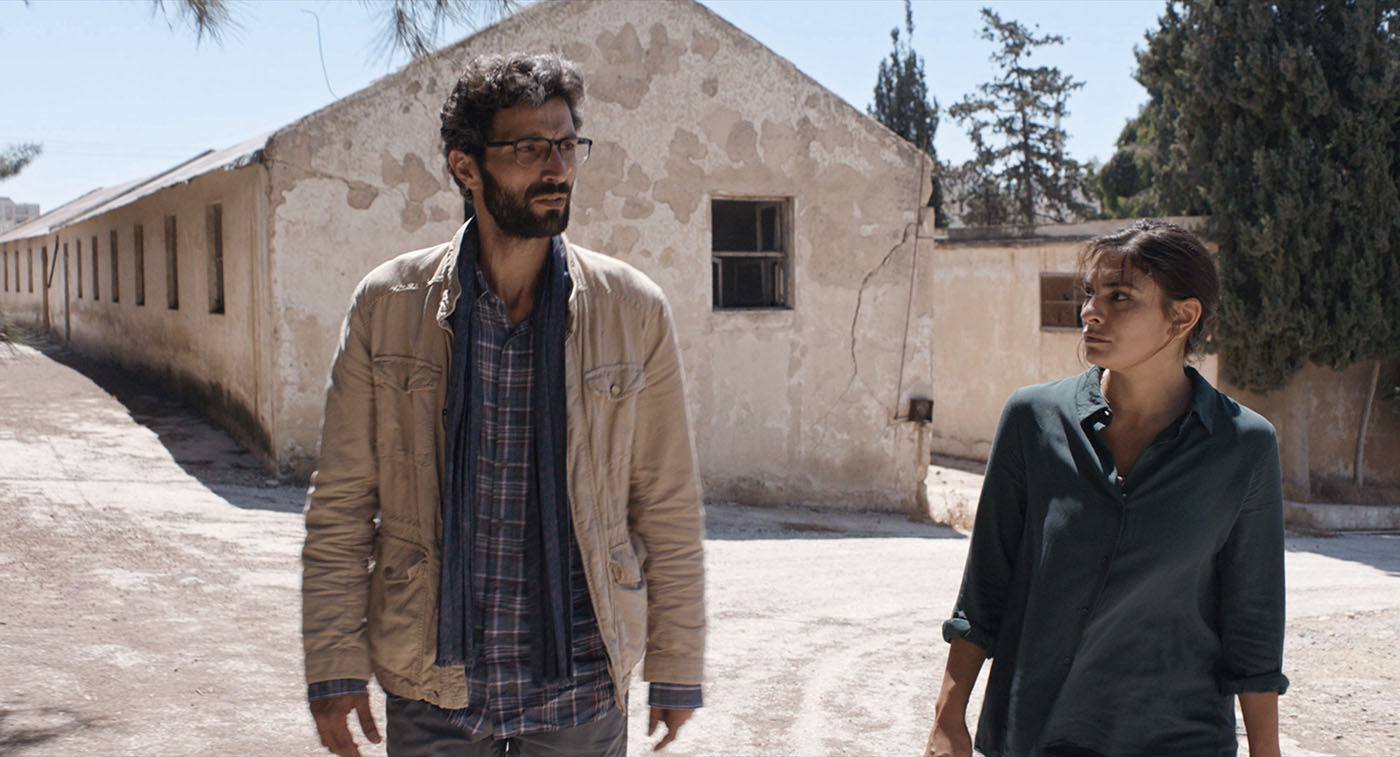The Translator is available in the U.S. on iTunes, Amazon Prime Video, Google Play, VUDU, and Cable On-Demand platforms (Comcast, iNDemand, Vubiquity, Cox, etc). European VOD release dates haven’t been released.
Jordan Elgrably
The story begins thirty years before the Arab uprisings in Damascus, with parents and kids joining a street demonstration from their balconies, cheering on protesters as they call out, “we want freedom! we want dignity!” While his family members shout slogans from the balcony, young Sami, already adept at English, is trying to tune into the BBC on the large family radio, to see if the world knows what’s happening in Syria.
Fast-forward to the 2000 Olympics and professional translator Sami Najjar is interpreting for a star Syrian athlete in Sydney. Standing before cameras and the international press, Sami makes a calamitous slip of the tongue, a faux pas that will change the course of his life, pushing him into exile. Though he stays in Australia, Sami’s thoughts are never far from what is transpiring back home.
At the heart of The Translator from Syrian filmmakers Rana Kazkaz and Anas Khalaf is the Syrian dilemma — and the dilemma of all people who yearn for political freedom — what can you do to fight oppression? How will you act? When will you speak out? Americans and Europeans have the luxury, by and large, of political free speech. We can shout from the rooftops and publish what we want, without fear of being arrested and disappeared — not that American and French cops, for instance, don’t bash heads, shoot tear gas and rubber bullets at us, arrest and bully Black Lives Matter or Gilets jaunes protesters. But we don’t vanish into prisons of the Mukhabarat; we don’t anticipate that we might be murdered for speaking out.
Talking about the genesis of The Translator, co-directors Kazkaz and Khalaf admit that at first, when civil unrest broke out in 2011 and they were living in Damascus, they did nothing. “We did not participate in the peaceful demonstrations that took place at the beginning of the Syrian revolution,” they say. “Although we supported the demonstrators, we did not lend our voice. We were afraid to. Afraid to be arrested, tortured or killed.” The husband-and-wife team had young children of their own, a daughter and a son, in 2011, and they were not prepared to risk everything. Years later, however, they wrote the script (with Magali Negroni) and raised the money to make a film that would pay homage to fellow Syrians who risked or lost their lives. Kazkaz and Khalaf admit that, “although we fully recognize that making a film about the revolution pales in comparison to those who risked their lives to participate, this film nonetheless represents the need to testify.”
The Syrian dilemma, according to one exiled Syrian I talked to, who had spent time in Bashar al-Assad’s jails, is the hard choice one must make — to either join the fray, or say nothing:
“You have three positions to take, in 2011: Pro-regime, pro-revolution or silent majority. Okay? You have to fall into one of these three categories…I put those three options in front of me. Definitely I’m not going to be pro-regime, that’s for sure. Between silent majority and the pro-revolution, I would say because I understood why we got to that point, and because I had a dream that we need to move the country from this situation to another situation, and that cannot be done if everyone is going to say if I act, it’s going to be dangerous to the people around me, so I’m not going to act; then nobody will act and we will just stay as we were. So yes, it was an adventure. We lost the adventure, we did not win, but we tried.”
—Prisoner X

“The adventure,” as Prisoner X put it, continues in Syria and Sisi’s Egypt, where today an estimated 60,000 political prisoners languish in jail — and nobody knows precisely how many Syrians have been disappeared or murdered by Bashar al-Assad’s criminal regime.
In any event, there comes a time in Sami Najjar’s life when it no longer suffices to be a translator, to interpret the words and deeds of others. Until 2011, Sami remains a more or less passive observer, while friends and family members take great risks to demand basic political rights. The crux of The Translator is how the protagonist will find new strength to face his adversaries in Syria.
In addition to presenting the central Syrian dilemma to act or remain silent, Kazkaz and Khalaf address the matter of the translator’s responsibility to faithfully relay the words of others, giving the role its due gravity, but the film is not really about the internal conflicts that translators routinely deal with in their work. (For a thorough examination of the many challenges translators face, I recommend Anna Aslanyan’s inspired book Dancing on Ropes: Translators and the Balance of History — Profile Books, 2021.)
Central to the strife in Syria and this film is the question of whether international pressure or opinion had any effect on the Syrian regime — could a phone call or a threat from a western leader get Bashar al-Assad to do anything, such as release prisoners or end a military siege? The world’s ability to react to the plight of ordinary Syrians and come to their aid remains a nagging stressor in the film. Afterwards I found myself wondering just how much international pressure did to alleviate the bitter realities in Syria, or in places like Sarajevo, Rwanda or even the Tiananmen Square protests and massacre, in Beijing in 1989. Whether and how much international pressure made any difference in Arab uprisings in Egypt, Tunisia and Libya remains the bailiwick of historians and scholars of the Arab Spring.

The Translator is a well-crafted thriller that maintains a steady level of stress and anxiety in the viewer, conveying how it feels every day when you go out, living with paranoia, not knowing if you will be arrested, or if when you get home, your loved ones will still be there.
To live in a dictatorship, one must cope with a near-constant state of uncertainty — either that or disengage with drugs, as many politically oppressed people do in Syria, Egypt, Saudi Arabia, where many are hooked on amphetamines, or Iran, where opium, much of it trafficked from Afghanistan, continues to be the escape of choice.
Without giving anything away, The Translator ends with an unexpected twist. Anyone who has ever asked themselves what they would do in a life-or-death situation can benefit from a viewing of the film.




